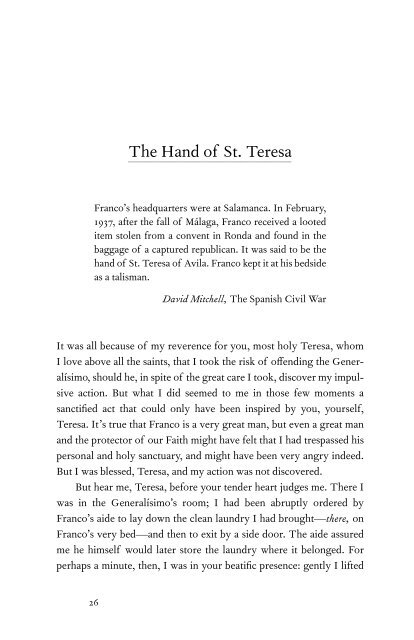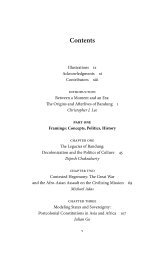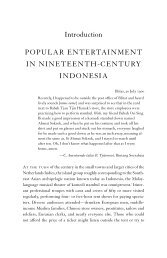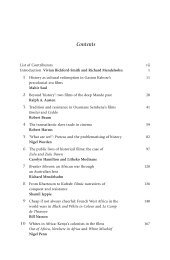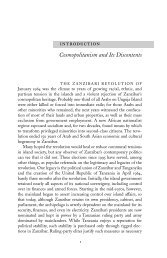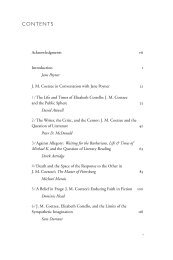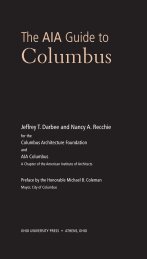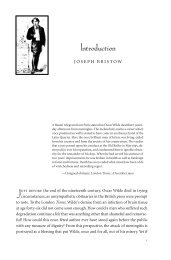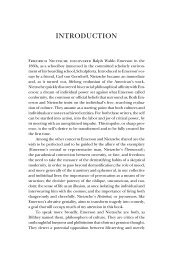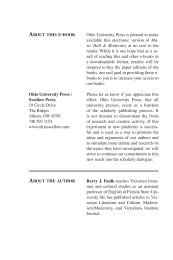The Confessions of Señora Francesca Navarro and Other Stories ...
The Confessions of Señora Francesca Navarro and Other Stories ...
The Confessions of Señora Francesca Navarro and Other Stories ...
Create successful ePaper yourself
Turn your PDF publications into a flip-book with our unique Google optimized e-Paper software.
<strong>The</strong> H<strong>and</strong> <strong>of</strong> St. Teresa<br />
Franco’s headquarters were at Salamanca. In February,<br />
1937, after the fall <strong>of</strong> Málaga, Franco received a looted<br />
item stolen from a convent in Ronda <strong>and</strong> found in the<br />
baggage <strong>of</strong> a captured republican. It was said to be the<br />
h<strong>and</strong> <strong>of</strong> St. Teresa <strong>of</strong> Avila. Franco kept it at his bedside<br />
as a talisman.<br />
David Mitchell, <strong>The</strong> Spanish Civil War<br />
It was all because <strong>of</strong> my reverence for you, most holy Teresa, whom<br />
I love above all the saints, that I took the risk <strong>of</strong> <strong>of</strong>fending the Generalísimo,<br />
should he, in spite <strong>of</strong> the great care I took, discover my impulsive<br />
action. But what I did seemed to me in those few moments a<br />
sanctified act that could only have been inspired by you, yourself,<br />
Teresa. It’s true that Franco is a very great man, but even a great man<br />
<strong>and</strong> the protector <strong>of</strong> our Faith might have felt that I had trespassed his<br />
personal <strong>and</strong> holy sanctuary, <strong>and</strong> might have been very angry indeed.<br />
But I was blessed, Teresa, <strong>and</strong> my action was not discovered.<br />
But hear me, Teresa, before your tender heart judges me. <strong>The</strong>re I<br />
was in the Generalísimo’s room; I had been abruptly ordered by<br />
Franco’s aide to lay down the clean laundry I had brought—there, on<br />
Franco’s very bed—<strong>and</strong> then to exit by a side door. <strong>The</strong> aide assured<br />
me he himself would later store the laundry where it belonged. For<br />
perhaps a minute, then, I was in your beatific presence: gently I lifted<br />
26
the coverlet <strong>of</strong> Franco’s pillow <strong>and</strong> beheld your blessed h<strong>and</strong>. A flood <strong>of</strong><br />
light entered my very soul—the radiance from your Light, no doubt—<br />
<strong>and</strong> I was inspired to lay one <strong>of</strong> Franco’s spotless h<strong>and</strong>kerchiefs across<br />
your h<strong>and</strong>, <strong>and</strong> I swear I saw (or felt) the outline <strong>of</strong> your h<strong>and</strong> stir beneath<br />
mine. For me it was a confirmation <strong>of</strong> the rumor (which most<br />
people believed to be true) that General Franco, the bravest man in<br />
Spain, slept every night upon the holy relic <strong>of</strong> your h<strong>and</strong>, that he took<br />
it with him wherever he traveled.<br />
When I arrived home with the precious imprint <strong>of</strong> your h<strong>and</strong>, I<br />
prayed for guidance as to what to do with it: nowhere in my humble<br />
home, which I have sorely neglected since Eusebio’s death eight years<br />
ago, seemed to me to be holy enough for such a sacred relic. So I kneeled<br />
at the small altar I maintain near the stove where it is warm even on the<br />
coldest nights here in Burgos. This altar, as you know, has been such a<br />
comfort to me, especially when I return from our church where I have<br />
been trusted for several years now to carefully dust the saints before<br />
early morning Mass. But your image, Teresa—a painting by a local<br />
artist rightly called “Paradiso,” as everyone remembers him—I keep<br />
on the wall nearest my bed, <strong>and</strong> the encouragement <strong>and</strong> sometimes<br />
exhortations that seem to issue from your bright visage lighten my<br />
loneliness. And on this memorable occasion my prayers were answered<br />
more swiftly than I could have dreamed <strong>of</strong>, <strong>and</strong> certainly more encouragingly<br />
than I deserve, with—as it seemed to me—your personal<br />
assurance that I was right to try to preserve the shadow <strong>of</strong> your beloved<br />
h<strong>and</strong>.<br />
On the very next day, while shopping at the market, I had a conversation<br />
with señora Gracia Vallecilla, whose husb<strong>and</strong> died during<br />
the raising <strong>of</strong> the siege by Franco at the Alcázar, <strong>and</strong> whose son—<br />
along with many Italian soldiers sent by our ally, Mussolini, to help us<br />
fight the enemy—had been captured by the Republicans at the Battle<br />
<strong>of</strong> Guadalajara. You know señora Vallecilla well, Teresa; she has endured<br />
much for our cause. On that morning she was wearing a simple<br />
wooden crucifix that gleamed like gold against the sorrowful black<br />
dress <strong>of</strong> our widows. When she noticed with what admiration I was<br />
27
gazing at it—an admiration greatly subdued, because it is, after all, a<br />
sacred image, not a mere adornment—she said quietly: “Yes, it’s beautiful,<br />
isn’t it? And the irony is that it was made by one <strong>of</strong> them, a former<br />
carpenter named Salvador Sempere Bartomeu, now in the Penal<br />
de Burgos.” When I expressed my surprise, she went on to say that she<br />
had entered into a correspondence as a madrina de guerra with one <strong>of</strong><br />
the prisoners in the Penal who had once been a family friend, but who<br />
was now condemned to cadena perpetua, <strong>and</strong> that she had begun taking<br />
food to him to help alleviate his suffering <strong>and</strong> perhaps bring him back<br />
to our Faith. “One must succor even those who despise us,” she added.<br />
“But one day when I took him some cheese <strong>and</strong> a loaf <strong>of</strong> bread, I heard<br />
this strange thing: that there was also in the Penal a prisoner—a carpenter<br />
who is also a talented artisan, one who used to carve statues <strong>of</strong><br />
saints <strong>and</strong> repair holy figures, mending the fingers <strong>and</strong> feet <strong>of</strong> the<br />
saints. Imagine, Concepción,” she exclaimed with a sad sigh, “a rojo<br />
who used to carve saints . . . Ah, there are many mysteries,” she continued,<br />
with a helpless gesture <strong>of</strong> despair <strong>and</strong> resignation at what this war<br />
had done to us all. “And by this act <strong>of</strong> charity, Concepción, I pray that<br />
God will find a way to do the same for my son: I have heard that when<br />
the Italians in the Republican army encountered the Italians in the<br />
Nationalist army at Guadalajara, there was much jubilation <strong>and</strong> both<br />
sides embraced their long-lost brothers. Let us at least hope such things<br />
are still possible . . .”<br />
At that moment, Teresa, I knew what I must do. Thank you,<br />
blessed saint, for revealing the answer to my troubled question: was I<br />
in a state <strong>of</strong> dire sin for having “stolen” the image <strong>of</strong> your h<strong>and</strong>—or<br />
had this action actually been inspired by you, the shadow <strong>of</strong> your h<strong>and</strong><br />
being a symbolic prelude to what you meant me to do?<br />
I decided at once that I should visit this carpenter who carves saints<br />
as soon as possible to see if he might, from the outline I had quickly<br />
drawn upon my return home from delivering Franco’s laundry, create<br />
for me an exact replica <strong>of</strong> your h<strong>and</strong>. <strong>The</strong> prison is over two kilometers<br />
from my home, but I decided that if the weather were fair, the next<br />
morning after my work at the church, I would set out, walking slowly:<br />
28 <strong>The</strong> H<strong>and</strong> <strong>of</strong> St. Teresa
since, after all, when one is carrying out a mission <strong>of</strong> God there is no<br />
need to rush—He will lead the way, surely enough.<br />
That evening I prepared a basket <strong>of</strong> food. We at the northern front,<br />
<strong>and</strong> especially here in Burgos where support for the Nationalists is<br />
strongest, we are not lacking in provisions, as the Republicans are. In<br />
addition, we can eat fish <strong>of</strong> all sorts <strong>and</strong> we have plenty <strong>of</strong> wheat, so<br />
there is no shortage <strong>of</strong> flour. We are not like our enemy, whose children,<br />
I have heard, are begging, shoeless, in the streets <strong>of</strong> Madrid for<br />
a few céntimos to buy beans <strong>and</strong> a bone for soup. So I prepared a nice<br />
loaf <strong>of</strong> wheat bread <strong>and</strong> pieces <strong>of</strong> sausage <strong>and</strong> a bit <strong>of</strong> lettuce. (<strong>The</strong>re<br />
is, I admit, a scarcity <strong>of</strong> fresh vegetables even among us, since there<br />
are far fewer men to work in the fields. Nearly all able-bodied men<br />
are at the front; there is not a man in this city <strong>of</strong> forty thous<strong>and</strong> souls<br />
who would not give his life to “save civilization,” as Franco so rightly<br />
tells us.)<br />
But as you yourself have written, Teresa, “Satan has many devices,”<br />
<strong>and</strong> that night as I lay thinking about my wonderful plan to duplicate<br />
your h<strong>and</strong>, I began again to have doubts. What would General<br />
Franco do if he knew what I had done? And that remarkable coincidental<br />
meeting with señora Vallecilla at the marketplace: was it really a<br />
message sent by you, Teresa? My spirits sank so low as even to question<br />
the wisdom <strong>of</strong> señora Vallecilla’s action in befriending a rojo. But<br />
finally I remembered that when you had written the story <strong>of</strong> your life,<br />
you told don Pedro de Castro, the Canon <strong>of</strong> Avila, that you had wanted<br />
to call it Of the Compassion <strong>of</strong> God rather than <strong>The</strong> Life <strong>of</strong> Mother<br />
Teresa. And since compassion is the golden thread that weaves together<br />
all the actions <strong>of</strong> your Life—even to founding a new convent—I decided<br />
that even if all the talk about this miserable prisoner being such<br />
a fine carpenter <strong>and</strong> sculptor turned out to be mere gossip, I would<br />
nevertheless go <strong>and</strong> take him some food to alleviate his condition. At<br />
the same time I could not help remembering your warning: “It is a<br />
great evil to be alone in the midst <strong>of</strong> such great danger”—so I continued<br />
to ponder whether suffering the presence <strong>of</strong> an enemy <strong>of</strong> our Faith<br />
was not a dangerous act <strong>of</strong> presumption on my part . . .<br />
29
But on my way to the prison the next morning, my doubts vanished.<br />
It was a beautiful morning. A s<strong>of</strong>t breeze seemed to have wafted<br />
toward Burgos all the way from the Bay <strong>of</strong> Biscay. <strong>The</strong> sun shone like<br />
a holy medallion in a sky as flawless as the purity <strong>of</strong> your soul, Teresa.<br />
And then, as if to confirm my belief that you approved <strong>of</strong> my visit, just<br />
as I neared the prison, I saw, flying low enough for me to make out the<br />
markings on his wings, an exquisite dove. At once there came into my<br />
heart <strong>and</strong> head, like the sudden flare <strong>of</strong> an altar c<strong>and</strong>le, your familiar<br />
words when you, too, were troubled: “I saw over my head a dove . . . I<br />
heard the rustling <strong>of</strong> its wings. My spirit grew calm.”<br />
But suddenly, Teresa, there was another dilemma for me. As I approached<br />
the entrance to the prison, the guard stopped me, barring my<br />
way with his rifle. He looked at me long <strong>and</strong> inquiringly, as if he knew<br />
me. <strong>The</strong>n, after looking into my basket <strong>of</strong> food, he asked, quite politely,<br />
I felt: “Are you a madrina de guerra?”<br />
<strong>The</strong>n I did indeed hesitate, Teresa, tormented by the strange necessity<br />
<strong>of</strong> lying—since, after all, I was not really a sponsoring “godmother”<br />
who had been writing letters <strong>of</strong> consolation <strong>and</strong> piety to the<br />
prisoner. But fortunately, still another <strong>of</strong> your “illuminations” came to<br />
my aid. At that very moment I recalled how you, Teresa, had tried to<br />
save Avila from the attacking Reds by lying: how it was that you appeared<br />
in a dream or vision to that wretched rojo, Colonel Madraga,<br />
<strong>and</strong> by falsely telling him that Avila was totally without arms <strong>and</strong> had<br />
no Nationalists there to defend that holy city, Colonel Madraga delayed<br />
his attack on Avila . . . so in that instant, I decided: if the blessed<br />
saint can lie in a good cause, why not I?<br />
But perhaps you meant to save me from the necessity <strong>of</strong> lying, because<br />
what happened was this: I had wrapped the loaf <strong>of</strong> bread in the<br />
Diario de Burgos, which <strong>of</strong> course the guard recognized as our Nationalist<br />
newspaper (I saw how he took special note <strong>of</strong> it), <strong>and</strong> then suddenly<br />
he exclaimed, with a slight chuckle, “Ah yes, I know you, you are<br />
señora Galindo Morales, the beata who cares for the saints in the<br />
church.” Now, I didn’t exactly like being called a beata—I have em-<br />
30 <strong>The</strong> H<strong>and</strong> <strong>of</strong> St. Teresa
ployment besides caring for my beloved saints—a necessity for me,<br />
really, since Eusebio’s death: He left me with virtually nothing. But I<br />
simply nodded my assent—I was, after all, the very woman he had<br />
recognized. I thanked him as he lowered his rifle <strong>and</strong> inclined his head<br />
toward me in a somewhat dubious bow, as if he were still confused as<br />
to why a beata would be bringing food to an enemy prisoner.<br />
Moments later I was shown into a windowless room whose concrete<br />
walls had clearly not been white-washed in many years. Across its<br />
surface cracks were spreading like a sort <strong>of</strong> demented scrawl. I stood<br />
alone in the room, waiting. <strong>The</strong>re were no chairs.<br />
Sempere was soon brought to me by two guards—so I wondered<br />
at first how I could possibly speak <strong>of</strong> my real purpose for this visit in<br />
their presence. But rather to my surprise, they left the room, <strong>and</strong> after<br />
exchanging a few greetings with the guard who had barred my way, returned<br />
to their duties. As there was no place to sit, Sempere <strong>and</strong> I stood<br />
contemplating each other for a few minutes.<br />
He was quite tall <strong>and</strong> emaciated, but with fierce gray eyes. To tell<br />
the truth, I was rather frightened by the intensity <strong>of</strong> his gaze—I could<br />
feel myself tremble—but I managed to control my fear in pursuit <strong>of</strong><br />
my objective. He had not spoken a word, but as he glanced down at the<br />
basket I had brought him, I saw him draw in a quick breath: the aroma<br />
<strong>of</strong> bread filled the dank room. However, I did not immediately h<strong>and</strong><br />
him the food. I wanted first <strong>of</strong> all honestly to explain why I had come—<br />
which I did, Teresa, rather quickly, stumbling on my words, but I think<br />
you would have approved.<br />
He looked at me as if I were mad. “Permit me to underst<strong>and</strong> you,<br />
señora,” he said, with sardonic amusement. “If I heard you correctly,<br />
you want me to carve the h<strong>and</strong> <strong>of</strong> a saint from the model”—he paused<br />
in disbelief—“a model based on the shadow <strong>of</strong> this Teresa’s h<strong>and</strong>?”<br />
I tried to explain how it was that I had first perceived—or “received”—the<br />
shadow <strong>of</strong> the saint’s h<strong>and</strong> on the h<strong>and</strong>kerchief, <strong>and</strong> that<br />
I had at once traced a faint outline <strong>of</strong> it (most reverently, I wanted to<br />
add, but I did not).<br />
31
“I see . . . ,” he said, rubbing his eyes. A faint sound rose from his<br />
throat that perhaps was simply an incredulous laugh, the laughter <strong>of</strong><br />
the Unbeliever, but sounded like a throttled sob. I waited silently.<br />
After a moment he shrugged, then said mockingly: “‘A shadow,’<br />
‘an imprint,’ ‘an outline’—whatever you say, señora. . . . Very well.<br />
Fine. I thank you for the food,” he concluded abruptly, glancing at the<br />
basket.<br />
I took the bread <strong>and</strong> cheese from the basket <strong>and</strong> placed them in his<br />
outstretched h<strong>and</strong>s. I noticed that they were red <strong>and</strong> swollen, <strong>and</strong> I<br />
averted my gaze. I promised I would return the following week. <strong>The</strong>n<br />
I h<strong>and</strong>ed him a clean white cloth onto which I had sketched an outline<br />
made from the original, now-sacred h<strong>and</strong>kerchief, which I had left on<br />
my altar at home. I dared not stay any longer, but as I turned to leave,<br />
I saw that he had already torn a piece <strong>of</strong> bread from the loaf <strong>and</strong> was<br />
devouring it like a starving man.<br />
<strong>The</strong> following week I came again as I had promised. This time the<br />
same guard, recognizing me at once, waved me on. I entered the visiting<br />
room alone. To my surprise, someone—perhaps the sympathetic<br />
guard—had placed a single chair in the room, meant no doubt for<br />
myself, but I preferred to st<strong>and</strong>.<br />
On this visit Sempere explained to me that although he was willing<br />
to try to create “a replica” (he could not suppress the irony in his<br />
voice as he said the word), he could not begin work on my request because<br />
prisoners were permitted to use only paper or cardboard for their<br />
“prison art”—he said the words as though they burned his lips. He<br />
went on to say, however, that if I could bring him food—he hesitated<br />
on the word “food” as if it humiliated him to speak <strong>of</strong> his terrible<br />
need—in a wooden box, <strong>and</strong> leave the box with him, he would be able<br />
to use it in carving the h<strong>and</strong>. Even for this, however, he did not have the<br />
necessary tool; but, he added quickly, with an anxious glance at the<br />
door, he could make such a tool himself from an empty sardine can. So,<br />
if the next time I came, I would bring him a can <strong>of</strong> sardines, he would<br />
begin work at once on the h<strong>and</strong>.<br />
32 <strong>The</strong> H<strong>and</strong> <strong>of</strong> St. Teresa
“<strong>The</strong>y are very careful here,” he explained with biting sarcasm,<br />
“not to let us keep any metal utensils, because we might make some<br />
weapon out <strong>of</strong> them with which to attack the guards—or to commit<br />
suicide,” he added bitterly. He hesitated a moment, glancing at me for<br />
my reaction, then continued in a torrent <strong>of</strong> contemptuous rage: “<strong>The</strong>y<br />
don’t want us to do that—they don’t want us to die, because then they<br />
can’t torture us . . .”<br />
I stared at him in disbelief. “But why might they want to do such<br />
a thing?”<br />
“Not ‘might.’ Did,” he said harshly. For a moment I felt he could<br />
attack me. But his facial expression s<strong>of</strong>tened as I asked in a barely audible<br />
voice if he himself had ever attempted—I could not bring myself<br />
to utter the word “suicide.”<br />
Silently he showed me his wrists—the slash marks were still raw.<br />
“A nun at the hospital took care <strong>of</strong> me,” he said. “She was horrified.<br />
She said it was the worst thing I could ever do. She said that even if this<br />
life seemed Hell, it was not ‘eternal’ . . . ” He fell abruptly silent, as if<br />
he felt he had said too much. Perhaps to overcome his feelings, he suddenly<br />
broke <strong>of</strong>f a piece <strong>of</strong> bread, assuming a calm <strong>and</strong> intimate manner,<br />
as if he had known me many months, his gray eyes observing me intently<br />
as he did so. I waited in silence, feeling anything I said might<br />
provoke him again. He chewed very slowly, as if he were a gentleman<br />
at ease in his own home—not at all like the hungry man I had witnessed<br />
devouring his food. <strong>The</strong>n, glancing at the door where the guard<br />
had begun to pace back <strong>and</strong> forth, he began to speak hurriedly.<br />
“No, it’s true—your holy nun was right. Why bother to kill ourselves?<br />
We don’t need to commit suicide: they are simply killing us all<br />
one by one. We are dying <strong>of</strong> hunger. . . . We are dying <strong>of</strong> loneliness.<br />
Very few <strong>of</strong> us here have anyone . . . ,” he paused <strong>and</strong> looked at me<br />
strangely, “anyone who comes here, like you . . .” His voice grew<br />
husky, <strong>and</strong> he rushed on as if fearful that either I or the guard would interrupt<br />
him. “If we are sent to peel potatoes for their army, we watch<br />
intently for the precise moment when the guard may turn his head so<br />
33
that we can swallow a piece <strong>of</strong> raw potato, because if they catch us<br />
‘stealing potatoes,’ as they call it, we are put in punishment cells—in<br />
complete darkness . . . no space to stretch out . . . No, no, suicide is not<br />
the answer: I have learned that.”<br />
I breathed a sigh <strong>of</strong> relief. Like the nun who had saved him, I felt<br />
such a death would be the most horrible fate any human could inflict<br />
upon himself.<br />
He began to pace the room nervously, threshing the air with the<br />
bread like a scythe as he burst out: “But I’m still under threat <strong>of</strong> execution,<br />
don’t you know that? Don’t you underst<strong>and</strong>? You talk about<br />
‘shadows.’” He grimaced contemptuously. “One day it will happen.<br />
Like those who have gone before me. Simply: someone will come to my<br />
cell door, just like this”—he parted his h<strong>and</strong>s widely—“<strong>and</strong> he will call<br />
out to me, ‘Salvador, get ready!’ How do you like that?” he dem<strong>and</strong>ed<br />
fiercely, his voice edged with burrs. “No time to repent, eh? Your guys<br />
don’t wait around for that, eh? No—the only way we know if one <strong>of</strong><br />
us has been executed is that we hear the shots. Have you seen Goya’s<br />
painting—over a hundred years ago—<strong>of</strong> the men in Madrid waiting<br />
to be shot by the French? Well, that’s us. Nothing has changed—the<br />
way <strong>of</strong> execution is the same. Men waiting to be shot. Men waiting in<br />
terror for their names to be called. . . . <strong>The</strong>y have died by the hundreds:<br />
in the sports stadiums, in the bullrings, wherever we used to have joy,<br />
now we have executions. Is that what your Franco means by the New<br />
State?” He sank into the chair, burying his face in his h<strong>and</strong>s.<br />
I looked down at his bowed head. <strong>The</strong> hair had been cropped as<br />
close to the skull as possible, but nevertheless one could see the gray<br />
sprouts, like seedlings planted in the scarred skin. His eyebrows, too,<br />
were streaked with gray like the early feathers <strong>of</strong> a fledgling. I wanted<br />
to comfort him, to place my h<strong>and</strong> on his shoulder, but there was such<br />
energy radiating from him, as from some tormented saint or devil, that<br />
I could not move. I stood spellbound by a new wave <strong>of</strong> underst<strong>and</strong>ing,<br />
as though bound by a ring <strong>of</strong> fire.<br />
“Look at me,” he said in despair, raising his eyes to mine. “I am<br />
twenty-four years old . . .”<br />
34 <strong>The</strong> H<strong>and</strong> <strong>of</strong> St. Teresa
For the first time I dared to look at him directly. On his hollow<br />
cheeks, sunken from hunger or from the horrors he had witnessed, he<br />
wore already the whorled knots <strong>of</strong> age, rather like the silent etchings<br />
marking the years in the heart <strong>of</strong> a tree—only his were sharper, fresher<br />
markings, as if each whorl were a recent scarring, swelling outward in<br />
blood <strong>and</strong> pain.<br />
“Most <strong>of</strong> the prisoners here are even younger than I,” he continued.<br />
“I have seen them so transformed after a month <strong>of</strong> solitary confinement<br />
in a punishment cell that, like me, they look twenty years older<br />
than their age.” His voice had become hoarse <strong>and</strong> he had begun to<br />
speak very slowly. He stopped altogether for a moment, touching his<br />
mouth. “Excuse me, señora, my teeth . . . all <strong>of</strong> us here are suffering<br />
from scurvy.” As he said this he tried to smile—a terrible grimace, like<br />
the silent shriek <strong>of</strong> a skeleton. <strong>The</strong>n in an apparent effort to regain his<br />
composure he added in a scathing tone: “You, señora, on the other<br />
h<strong>and</strong>, while not much older than I, seem still very . . . young. . . .”<br />
I saw clearly that he meant no compliment but a moral judgment.<br />
If the years had weighed less heartily upon me—he wanted me to<br />
know—it was because my life had been comfortable, <strong>and</strong> it had been<br />
comfortable precisely because it was without moral purpose. I would,<br />
therefore, never look like him or his friends, ghouls hovering over their<br />
own open graves.<br />
But, Teresa, in spite <strong>of</strong> this gratuitous insult, I wanted to help<br />
him. More than that, I wanted to save him: I felt there was much that<br />
was good in him, <strong>and</strong> that with help, he could be saved <strong>and</strong> brought<br />
back to our Faith.<br />
But he rose abruptly to his feet, angry <strong>and</strong> confused: evidently he<br />
had said too much. He made a pained effort to bow in dismissal <strong>of</strong> my<br />
visit—a parody <strong>of</strong> a courtly bow. As he did so, I glimpsed fresh welts<br />
on his neck <strong>and</strong> purple bruises on his forearms. “I thank you again,<br />
señora . . . for the food.”<br />
With tears in my eyes I said simply, “De nada.” I added that I<br />
would bring him what he needed next week. And every week after<br />
that.<br />
35
Outside the room I stopped to give the guard ten pesetas. He, too,<br />
seemed to me suddenly old <strong>and</strong> tired, as if our war had turned our youth<br />
into a nation <strong>of</strong> old men.<br />
<strong>The</strong> following week I came with the wooden box Sempere had<br />
asked for, along with a can <strong>of</strong> sardines, some cheese, <strong>and</strong> a loaf <strong>of</strong> bread.<br />
He seemed to be more cheerful. He said they had just come from la<br />
rueda. “And what a wonderful thing, señora, to feel the sun on your<br />
head, to scare the lice <strong>of</strong>f your clothes, to feel your legs again as if you<br />
were a shark in the sea, with all your muscles alive. Ah, . . . you can’t<br />
imagine. But forgive me, señora. I’ve been rude. Thank you for the box<br />
. . . And that’s a nice little scarf on your head. But woe! Why do you<br />
women insist on wearing nothing but black, from head to foot? It’s a<br />
kind <strong>of</strong> bondage . . .”<br />
“You know very well, Salvador”—it was the first time I had called<br />
him by his first name. “It is our custom. It is a sign <strong>of</strong> mourning.” I had<br />
almost said “perpetual” mourning, but I could not say that: my widowed<br />
loneliness was mournful, but I was lonely even when Eusebio was alive.<br />
“I have been a widow now nearly eight years.” My voice trailed <strong>of</strong>f.<br />
“Ah . . .” His keen gray eyes stared at me in silence a moment, as if<br />
he were seeking some secret significance in this revelation. <strong>The</strong>n he<br />
added with his customary bitterness, “Well, at least he didn’t kill any<br />
Spaniards like us. And what did he . . . ?”<br />
“Heart attack,” I said briefly. I did not want to talk about Eusebio.<br />
Instead, I asked the question which I had had in mind from the moment<br />
he had mentioned “the wheel.” “And what exactly is this rueda<br />
you spoke <strong>of</strong>? What kind <strong>of</strong> a wheel?”<br />
While be began with exaggerated attention to look into the box <strong>of</strong><br />
food—this I saw as a way <strong>of</strong> avoiding the risk <strong>of</strong> the sort <strong>of</strong> emotional<br />
breakdown he had suffered on my last visit—he murmured, “Ah, the<br />
‘wheel’ . . . Yes. . . . It’s our little social club, you see. Once a week they<br />
take us out <strong>and</strong> walk us around, or, rather, we walk ourselves around.”<br />
“‘Out’? Out where?” I was confused. <strong>The</strong> prison yard was quite<br />
small, <strong>and</strong> to have taken them elsewhere merely to walk would be<br />
unthinkable.<br />
36 <strong>The</strong> H<strong>and</strong> <strong>of</strong> St. Teresa
“Do you know what la ganta is?” he asked in a more mollifying<br />
tone. “Do you grasp the idea <strong>of</strong> an axis?”<br />
I nodded silently, stifling the temptation to say, “Of course I know<br />
what an axis is!” But that seemed the most selfish <strong>of</strong> vanities under the<br />
circumstances. I remained silent.<br />
“This is how we get our ‘promenade.’ We are led outside <strong>and</strong> ordered<br />
to st<strong>and</strong> one by one—separated from each other by about a<br />
meter. <strong>The</strong>n we prisoners walk our skinny legs around the axis. Woe<br />
unto any prisoner, señora, who in that little exercise turns his head to<br />
look directly into his fellow prisoner’s eyes—or worse, if he were to<br />
move his lips—even in prayer.” He could not resist the jibe, but his<br />
voice had swelled into a solemn tone, rather like plainsong. “But at<br />
least out there in the wheel—or on the wheel, if you think <strong>of</strong> the Inquisition—I<br />
see friends I haven’t seen since the war began . . . How<br />
painful to see them, these new prisoners, yet how good to see them<br />
still alive.” He began to cough, as if having difficulty breathing, but I<br />
could see he was choking with tears. “<strong>The</strong>re are eighteen hundred<br />
prisoners in this place—doctors, lawyers, pr<strong>of</strong>essors, teachers <strong>of</strong><br />
every subject in the known world <strong>and</strong> beyond. Firemen, <strong>and</strong> shepherds,<br />
too—even carpenters like me. Do you really think all these<br />
condemned men are against God <strong>and</strong> a menace to civilization? Why,<br />
who was it that bombed Vizcaya? Who was it that bombed civilians in<br />
Durango—people with not so much as a rifle in their h<strong>and</strong>s? This killing<br />
<strong>of</strong> civilians—dive-bombing, they call it—bombing <strong>and</strong> machinegunning<br />
any human target . . . Whoever heard <strong>of</strong> such a thing in the<br />
entire history <strong>of</strong> humankind? And they killed nuns too, their Condor<br />
Legion did. In Durango over a hundred nuns died. But who counts<br />
how many they kill? <strong>The</strong>y kill for target practice, as a pastime. Even<br />
one <strong>of</strong> your own generals has described your German allies”—the<br />
word seemed wrenched from him in a burst <strong>of</strong> fury—“as ‘beasts <strong>of</strong><br />
prey.’”<br />
I was silent. I could not explain the bombing <strong>of</strong> Durango. Who can<br />
explain the suffering <strong>of</strong> the innocent? I felt my heart would break with<br />
sorrow as I listened, but I dared not speak.<br />
37
<strong>The</strong>n in a sudden savage outcry he shouted: “And what about<br />
those nuns who right now, during the reign <strong>of</strong> your Generalísimo”—a<br />
tiny froth <strong>of</strong> rage appeared on his cracked <strong>and</strong> swollen lips as he spat<br />
the word—“your Head <strong>of</strong> State, right now have been imprisoned, some<br />
<strong>of</strong> them with tuberculosis? And, for what reason, Concepción? Only<br />
because those unhappy women are loyal above all to their God <strong>and</strong> to<br />
Truth. Truth, Concepción, not this hell <strong>of</strong> lies published every day just<br />
for the prisoners”—he pulled a folded copy <strong>of</strong> Redención from his<br />
pocket <strong>and</strong>, advancing slightly toward me, ripped it apart. “<strong>The</strong>se ‘servants<br />
<strong>of</strong> God,’ as even your Primate <strong>of</strong> Toledo would call them, have<br />
refused to lie, have refused to swear that it was the Republicans themselves<br />
who bombed Guernica, just to win sympathy for their cause.<br />
No, no, Concepción, it was not we who bombed Durango, killing a<br />
priest who was in the very act <strong>of</strong> lifting the Host—”<br />
But I could listen no longer. Sobbing, I fled from the room, thinking,<br />
“I will never come back. I must not believe him.”<br />
That night I could not sleep. <strong>The</strong> godlessness <strong>of</strong> the world seemed<br />
to have invaded me. All night long I heard the screams <strong>of</strong> Guernica,<br />
saw the bodies falling, destroyed, saw nuns, their broad white wimples<br />
flaring into flames, like burning birds set afire in the sky. Over <strong>and</strong> over<br />
I asked myself: can all this be the lies <strong>of</strong> those who would destroy our<br />
Faith? As you wrote in your Life, Teresa, Satan himself is a lie. But<br />
then I reflected: even if Sempere is lying about these killings <strong>and</strong> tortures,<br />
if it were later found to be true that a single human being created<br />
in God’s image had been subjected to such pitiless cruelty, then would<br />
it not poison the validity <strong>of</strong> our crusade against them?<br />
And then, too, Teresa, must we not consider redemption? Even<br />
though they are Reds, can they not be saved? I have heard <strong>of</strong> a fierce<br />
anarchist who, after smashing the statue <strong>of</strong> Our Lady, sobbed brokenheartedly,<br />
<strong>and</strong> began praying fervently to the shards <strong>of</strong> Our Lady to<br />
forgive him . . . Is there not hope for such a man? And may there not<br />
be many others like him? What, for instance, <strong>of</strong> those two Reds who<br />
broke down the door <strong>of</strong> the Caserio in Alicante to save the priceless<br />
38 <strong>The</strong> H<strong>and</strong> <strong>of</strong> St. Teresa
holy statue <strong>of</strong> Santa Faz from destruction? At the eleventh hour <strong>of</strong> the<br />
New State, shall they too not be saved from destruction?<br />
All week long my peace <strong>of</strong> mind was ravaged with questions, exhortations,<br />
guilt. I knew I was in a state <strong>of</strong> sin, because I had failed to<br />
go to my confessor about my visits <strong>and</strong> had not taken communion in<br />
nearly a month. Nor had I been to our church to care for the altar statues.<br />
Soon, someone, I was certain, becoming concerned for my health,<br />
would come to my door, asking questions. But it is I, Teresa, who have<br />
the questions. Why are they unanswerable?<br />
I argued with myself futilely. My arguments were filled with false<br />
learning, with presumption, with guilt. Finally, in the calmest manner<br />
possible, as if I were Mary Queen <strong>of</strong> Scots going to the scaffold for her<br />
Faith, I packed a basket <strong>of</strong> food for Sempere: sausage <strong>and</strong> bread <strong>and</strong><br />
olives <strong>and</strong> fried fish, <strong>and</strong> two small oranges brought to the north all the<br />
way from Málaga.<br />
Sempere came into the visiting room slowly, walking somewhat<br />
unsteadily. His right shoulder, I noticed at once, was held higher than<br />
the other, as if it pained him. He made no attempt to apologize for his<br />
outburst the previous week, but said simply, as I h<strong>and</strong>ed him the food,<br />
“Thank you,” adding s<strong>of</strong>tly, “I was afraid you would not come back.”<br />
“It’s not easy to forget what you say . . .” I murmured. “I had<br />
many doubts.” And for the first time in our visits I sat down in the chair<br />
the guard had left for me. But this simple action seemed suddenly intimate<br />
<strong>and</strong> forbidden. I rose to my feet again quickly.<br />
We talked about the food for a few moments, after which he mentioned<br />
that during the week he had had the good fortune—“or bad,” he<br />
added forlornly—to discover that there were here in the prison two<br />
good friends who had been with him at the Battle <strong>of</strong> Bricia. He went on<br />
to say, with a strange laugh, that these two friends were among only a<br />
h<strong>and</strong>ful <strong>of</strong> men who, along with himself, had attacked the enemy cavalry.<br />
“I was accustomed to fighting men,” he exclaimed, “but it’s quite<br />
a different battle when it’s horses. <strong>The</strong>y are so powerful, one can’t<br />
imagine overcoming their magnificent strength. And somehow it’s still<br />
39
a shock to have to kill a beautiful animal just because he’s in your<br />
way: you’ve got to bring the rifleman down <strong>and</strong> you’ve got to destroy<br />
the horse along with the enemy. And these horses were terrified,” he<br />
added with a strange sort <strong>of</strong> melancholy, “perhaps more frightened<br />
even than I . . . It was an amazing sight, really: in spite <strong>of</strong> my fury with<br />
the enemy, I could see my men tearing at the stirrups, thrusting at the<br />
horses, wrapping their arms as far as they could around the beasts,<br />
crushing themselves against those formidable kicking legs, while the<br />
whole battle seemed lit up by those remarkable equine eyes. Ah . . .”<br />
he added with helpless envy, opening his h<strong>and</strong>s as if to show the emptiness<br />
he held, “it would take a master to paint such a scene . . .”<br />
I was not sympathetic. Not only was this the first time I realized<br />
that he had been some sort <strong>of</strong> leader (“my men”), but I saw his sorrow<br />
over the killing <strong>of</strong> horses, rather than over the killing <strong>of</strong> men he believed<br />
to be his enemies, as one more sign <strong>of</strong> his corruption. I decided<br />
I should listen to no more <strong>of</strong> this sort <strong>of</strong> sentiment <strong>and</strong> should leave at<br />
once. But then, suddenly he added with a boyish pride which surprised<br />
me, “You should have seen me. I was welded to the horse as if we were<br />
one creature. It was the most fierce battle <strong>of</strong> my life. And we lost the<br />
battle . . . So, you see me now . . .” He shrugged. “Every day after that,<br />
it seemed, we lost. Sant<strong>and</strong>er fell. Thous<strong>and</strong>s <strong>of</strong> us fleeing the destruction<br />
<strong>and</strong> nowhere to escape for most <strong>of</strong> us except by sea. And in the<br />
Bay <strong>of</strong> Biscay there was hardly a rowboat even for the fleeing civilians.<br />
It was terrible: people with no place to go jumped into the sea. But<br />
there was a car . . . And four men, my friends, Concepción, jumped into<br />
this car, they accelerated it, <strong>and</strong> shouting to the silent ‘democracies’ <strong>of</strong><br />
the world, ‘¡Viva la República! ’ they drove into the sea. <strong>The</strong>y were gone<br />
in minutes . . . minutes . . .”<br />
I could not bear to hear any more. Only God knew what be would<br />
tell me next. I did not even remember to ask if be had been able to<br />
work on your h<strong>and</strong>, Teresa; I was shivering with cold, like someone<br />
threatened by some deadly disease. I fled the room, I ran home like a<br />
demented woman, a cold wind whipping my h<strong>and</strong>s, my empty basket<br />
beating at my side like my pounding heart.<br />
40 <strong>The</strong> H<strong>and</strong> <strong>of</strong> St. Teresa
That night I dreamed <strong>of</strong> angels—more like centaurs than angels—<br />
smiling strangely, galloping their horses through the heavens, like a<br />
horde <strong>of</strong> rebel angels Satan had lured to the edge <strong>of</strong> the world, plunging<br />
them into Hell.<br />
Time <strong>and</strong> time again my sleep was broken with these wild dreams.<br />
<strong>The</strong>n toward morning I dreamed that my bed was on fire. I leaped from<br />
the imagined flames, bathed in sweat: it was bitter cold in my room.<br />
And perhaps for the first time in my life, Teresa, I cursed. I heartily<br />
cursed this war which has divided us all, brother against brother, father<br />
against son, sisters in travail, mothers weeping over their destroyed <strong>and</strong><br />
broken children. And I began even to question the final justification for<br />
it all, recalling suddenly how years ago a great monsignor had come to<br />
our church on Christmas Eve <strong>and</strong> given a sermon in which he said that<br />
there were four conditions for a just rebellion. I’ve forgotten what the<br />
other three were, but one <strong>of</strong> them came to me with strange clarity that<br />
bitter cold night as I sat sweating <strong>and</strong> shivering: “that the probable<br />
harm done by the revolt must not be greater than the probable harm<br />
done by the absence <strong>of</strong> the revolt.” So where are we today, Teresa,<br />
with all our dead, with foreigners on our soil killing Spaniards?<br />
This time I stayed away for three weeks. Even the sculpture <strong>of</strong> your<br />
h<strong>and</strong>—forgive me, Teresa—had become irrelevant. I cursed Sempere<br />
again <strong>and</strong> again for plaguing my life. Let the infidel be damned, I said,<br />
for insinuating himself into my thoughts, for creating occasions for sin<br />
<strong>and</strong> provocation for chaos, disorder, obsession . . . But finally I decided<br />
that you would want me at least to have the sculpture <strong>of</strong> your<br />
h<strong>and</strong> that had so inspired me. I would go to him once more only. This<br />
time, however, I prepared a very sparse basket—only a few oranges<br />
for the wretched infidel’s teeth. I cursed him again even as I placed the<br />
fruit in my basket (you see, Teresa, how sinful I had become).<br />
On this visit I noticed at once that there were new bruises above<br />
his eyes. Were they beating him? I wondered, <strong>and</strong> what new occasion<br />
would his guards have had for doing so? But I immediately suppressed<br />
such thoughts: if I were to believe a single one <strong>of</strong> his sad stories, then<br />
I would have to believe them all. And I refused to do this, now that at<br />
41
last I had convinced myself that at best his stories were exaggerations,<br />
<strong>and</strong> at worst, deliberate lies. But he did in fact seem much changed<br />
since my last visit. He was for the first few minutes <strong>of</strong> this visit grave,<br />
distant, <strong>and</strong> for the most part silent. If it were possible, he was even<br />
more emaciated than ever: a strong wind would have bent him like a<br />
reed into the s<strong>and</strong>y beaches <strong>of</strong> the Bay <strong>of</strong> Biscay.<br />
“You were gone a long time,” he said at last.<br />
“Not so long,” I retorted defensively.<br />
“Meanwhile,” he went on, ignoring my denial, “I have been removed<br />
from the labor battalion—for ‘bad behavior’” he said with a sad<br />
smile, adding, “<strong>and</strong> worse than that: I am very sorry for this, but I<br />
could not complete the sculpture. I did manage to make an excellent<br />
tool by crushing the sardine can <strong>and</strong> sharpening it to a fine point on the<br />
cement floor <strong>of</strong> my cell. But just last week as I was working on the<br />
index finger—I had carved it so that it pointed directly at the viewer—<br />
they confiscated my tool, accusing me <strong>of</strong> having a concealed weapon.<br />
Worst <strong>of</strong> all, they have destroyed the h<strong>and</strong>—a work <strong>of</strong> art . . .”<br />
“Perhaps God willed it. Perhaps it was not meant to be . . .” I said<br />
sadly. I rose to my feet somewhat shaken with disappointment. Automatically<br />
I h<strong>and</strong>ed him the basket, but he did not even look at it. So I<br />
placed the basket on the chair. As I prepared to leave, I noted that he<br />
was looking directly, searchingly at me. <strong>The</strong>re was a long silence in<br />
which I was torn between pity for his ravaged countenance <strong>and</strong> the<br />
need to flee at all costs from the alluring risks <strong>of</strong> my compassion.<br />
Finally, he said, “Yes . . . I have done it right,” <strong>and</strong> h<strong>and</strong>ed me a<br />
scrolled sheet. “It is a portrait,” he said shyly. “Of you . . . I used what<br />
colors I could get . . . or make—there are not many. It is my gift, my<br />
thanks—I have no other way. You have . . .” He paused uncertainly.<br />
“You have fed me, body <strong>and</strong> soul . . . You have saved me from . . .” His<br />
throat tightened with emotion <strong>and</strong> he could not continue. He stood<br />
gazing in silence at the wall near which we stood, his eyes fixed on the<br />
cracked <strong>and</strong> peeling surfaces as if he were looking for a place on a map.<br />
But I was determined to summon up my spiritual strength at last<br />
<strong>and</strong> resist the temptations <strong>of</strong> pity. I had seen how the seduction <strong>of</strong> evil<br />
42 <strong>The</strong> H<strong>and</strong> <strong>of</strong> St. Teresa
companions could lead to dreams <strong>of</strong> apocalyptic angels falling from<br />
the edge <strong>of</strong> Heaven. Thanking him, but without opening the scroll, I<br />
removed the oranges from my basket <strong>and</strong> laid them on the chair as<br />
carefully as if I were preparing an altar. <strong>The</strong>n I placed the scroll in my<br />
basket <strong>and</strong> turned to leave.<br />
“May God be with you,” was all the compassion I conceded to<br />
him on that visit. As I moved quickly toward the door, murmuring excuses<br />
for my hasty departure, I looked back. He stood in the middle <strong>of</strong><br />
the room—alone, exiled from Earth, excluded from Heaven. In the<br />
crepuscular light <strong>of</strong> the windowless room, the oranges gleamed<br />
grotesquely, like a pair <strong>of</strong> lost souls floating headless through space.<br />
I shut the door behind me. <strong>The</strong> guard who had been leaning<br />
against the wall stood erect. “Buenas noches, señora Galindo,” he<br />
said respectfully. I gave him all I had—twenty pesetas.<br />
When I arrived home I placed the scroll on my kitchen table<br />
without opening it. I was—how shall I say, Teresa?—afraid to see it.<br />
But after praying before the altar, I carefully unrolled it.<br />
Teresa, I was stunned: I was beautiful. He had created <strong>of</strong> my hair<br />
glossy black wings above each ear. My eyes gleamed a bright cinnamonbrown,<br />
their pupils lit by a kind <strong>of</strong> terror, as <strong>of</strong> a frightened horse . . . I<br />
dared not ask myself where he had managed to get the colors: the s<strong>of</strong>t<br />
carnelian <strong>of</strong> the lips, the black scarf lit up by a scattering <strong>of</strong> bright red<br />
drops with the transparency <strong>of</strong> rain. For some reason he had portrayed<br />
me looking upward, in a sort <strong>of</strong> annunciatory trance, rather like a Zurbarán.<br />
I pressed my mouth to the red drops on the scarf from which so<br />
much light emanated. <strong>The</strong> bitter taste <strong>of</strong> blood flooded my throat, <strong>and</strong><br />
I wept . . .<br />
Teresa, here is my ultimate confession: I studied the painting; I<br />
pondered it. Alas, I ended by loving it: for the first time in my life I<br />
felt I was being caressed as a woman. Teresa, Eusebio was a good<br />
man. I was his wife, whom he respected, but he did not desire me. I<br />
did not evoke his passion or his praise: the difference was suddenly<br />
revealed to me by Salvador’s portrait. And I wept for my childless<br />
widowhood.<br />
43
Finally I turned the portrait over. <strong>The</strong>re he had written in a large,<br />
confident scrawl: “For <strong>Señora</strong> Concepción Galindo Morales, From Salvador<br />
Sempere Bartomeu.” I scrutinized the shape <strong>of</strong> the letters as if<br />
they were some ancient rite <strong>of</strong> divination. <strong>The</strong> appearance <strong>of</strong> his name<br />
so close to mine caused in me a rapturous tremor. I began to realize in<br />
that moment that I was lost . . .<br />
I spent the following week praying <strong>and</strong> asking myself whether I<br />
should not, after all, return to bring him food: subsisting on his prisoner’s<br />
rations, he would soon surely starve or succumb to some fatal<br />
illness. I decided, finally, that to discontinue these acts <strong>of</strong> charity was<br />
against our common humanity. Having made my decision, I promptly<br />
packed a basket—this time with a large round loaf <strong>of</strong> bread, several<br />
hard-boiled eggs, <strong>and</strong> a bit <strong>of</strong> cheese. I had no more oranges.<br />
It was a beautiful morning. <strong>The</strong> compassionate sun wove through<br />
the few clouds in garments <strong>of</strong> gold. A few brave flowers, not knowing<br />
the rites <strong>of</strong> season, bloomed ahead <strong>of</strong> their time. I walked toward the<br />
prison in a sort <strong>of</strong> rapture such as you describe, Teresa: blessing every<br />
man, woman, <strong>and</strong> child in the world. It seemed I had no room in my<br />
heart for hatred or for fear <strong>of</strong> enemies, <strong>and</strong> as I walked along, gently<br />
swinging my basket like a young girl, I recalled suddenly the words <strong>of</strong><br />
St. Francis, “Let me bring love.” But the recollection <strong>of</strong> the Saint<br />
speaking to the birds brought something remarkable to my attention. It<br />
seemed as if there were absolute silence in the world: not a voice<br />
echoed, not a church bell rang; no birds sang. I halted in the path to the<br />
prison entrance, struck by this unprecedented phenomenon: it was if I<br />
were suddenly immersed in Eternity, where there was no need to<br />
speak, to explain or exult, no other sound but the voice <strong>of</strong> God. I put<br />
my basket down for a moment <strong>and</strong> listened to the silence, as if I were<br />
awaiting God’s Word . . .<br />
<strong>The</strong> silence was soon broken: I heard the scraping sound <strong>of</strong> a<br />
metal door against concrete: I picked up my basket <strong>and</strong> walked slowly<br />
to the prison entrance.<br />
To my surprise the guard who had been there on all my previous<br />
visits was gone: there was a new guard, his heavily lidded eyes staring<br />
44 <strong>The</strong> H<strong>and</strong> <strong>of</strong> St. Teresa
at me with cold contempt as I came to the door. At once, with military<br />
speed, he raised his rifle <strong>and</strong> barred my way: “You are not permitted to<br />
enter,” he said, narrowing his eyes with suspicion. “You will h<strong>and</strong> over<br />
your basket.” He did not address me by name. With an angry gesture,<br />
he flung back the napkin covering the bread; then with mathematical<br />
precision, as if working from a diagram, he broke the bread open at<br />
three points <strong>and</strong> pushed his h<strong>and</strong> into the s<strong>of</strong>t flesh for several silent<br />
moments. Finally he grunted, as if still unconvinced that the bread held<br />
no hidden weapons. But he did not return the basket.<br />
“You are not permitted to enter,” he repeated. “Sempere has been<br />
executed. He <strong>and</strong> two others were plotting an escape. <strong>The</strong> others, too,<br />
will doubtless be executed. Your former guard has been arrested for<br />
accepting bribes—from you <strong>and</strong> others. . . . Our comm<strong>and</strong>er will let<br />
you know when you are to appear to give us information about the<br />
prisoner. Until then, you are not to leave the city.”<br />
My knees buckled; the sky darkened. I managed to stagger away<br />
from the prison gate <strong>and</strong> into a nearby street before I fell to the ground,<br />
sobbing. When I rose to my feet, I made my way blindly homeward—<br />
seeing no one, speaking to no one, moaning like a broken animal.<br />
When at last I arrived home, I flung myself face downward on the floor,<br />
like a penitent. I wept; I pounded the floor. Teresa, I felt I should have<br />
gone to Franco on my knees as Salvador’s mother would have done,<br />
<strong>and</strong> begged for his life. I felt that like that priest, Aixti, who <strong>of</strong>fered up<br />
his life for a Republican prisoner who had not yet confessed <strong>and</strong> received<br />
absolution, I too should have gone to someone—the guard, the<br />
comm<strong>and</strong>er, to Franco himself, <strong>and</strong> <strong>of</strong>fered up my life: would they have<br />
accepted it? I, at least, could have confessed my sins . . . But, Teresa: to<br />
kill a man while his soul is yet condemned to eternal damnation—I ask<br />
you, which is the greater sin—to let an unbeliever live or to kill him<br />
unrepentant? You, yourself, have said, “Cursed be the loyalty which<br />
reaches so far as to go against the law <strong>of</strong> God.”<br />
<br />
And now, though many days have passed, I think only <strong>of</strong> my loss. I<br />
no longer go to the church to care for the saints. I no longer pray for<br />
45
forgiveness for my sins—for my pride, for my lack <strong>of</strong> humility, for my<br />
failure to underst<strong>and</strong> Salvador’s suffering: his poverty, his mother’s<br />
anguish, the desperate outcries <strong>of</strong> the bereaved, the impoverished <strong>and</strong><br />
destitute <strong>of</strong> the earth. . . . Think, Teresa, how he was tortured, how his<br />
friends were chained <strong>and</strong> taken away in a c<strong>of</strong>fle like slaves to labor for<br />
fifty céntimos a day. My failure to underst<strong>and</strong> all this, when he tried to<br />
tell me, now seems to me my grossest sin. . . .<br />
Now I am in perpetual torment. I am inconsolable. I am in despair.<br />
I hate the world because he is no longer in it . . . I think only <strong>of</strong> him,<br />
<strong>of</strong> him . . . Is this love, Teresa? Have I saved him from Hell or do I follow<br />
him there for all eternity? Tell me, Teresa. Tell me. . . .<br />
46 <strong>The</strong> H<strong>and</strong> <strong>of</strong> St. Teresa


